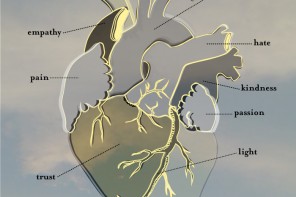The world is drowning in data and information and the role of the reporter is as important as ever. But just as inequality is growing, real reportage is at risk of becoming a rich man’s hobby. In this article, an unemployed graduate inspects the intimidating turrets of journalism’s formidable fortress.
Journalism is in steep economic decline. Newspaper circulation numbers are dropping every year and television news channels are slimming down their operations, slowly withdrawing reporters from around the globe – much like an ancient empire coming to the end of its dominion. Meanwhile, there is an unprecedented demand for online news in the form of articles, videos and even radio. Humanity is more curious about the world than ever before and is demanding more and more detail. The problem is that no one is paying for it.
As the pot of funds for the journalism industry shrinks, it is shrinking for higher education as well. Across the Western world, budgets are being slashed and fees are rising exponentially. Governments who once would have subsidized the next generation’s potential are in too much debt, and now they want students to get into too much debt so they don’t have to. The result is today’s neoliberal academia, in which students, lecturers and employers view higher education as a kind of long-term investment, which has turned universities all over the world into what journalist Chris Hedges describes as “vocational factories.” The above factors are combining to turn journalism into an elite profession, and the expensive and illustrious instructors that teach it could be exacerbating the dysfunctions of an already-tawdry trade.
There is already a supply and demand problem at play. There may be a higher number of ambitious young journalists than there are jobs in journalism, and the money generated by the demand for news is no longer enough to keep us all in meaningful work, and certainly not enough to maintain a middle-class lifestyle. Humans have reacted to the reduced number of seats at the top table by doing what they always do: by building expensive hurdles. An undergraduate degree in journalism is worth almost nothing on its own, therefore a master’s degree must be placed on top of it in order to prove to employers that one takes oneself seriously. The problem here is that a master’s degree costs thousands of pounds, and anybody who is able to study for one must be able to live for a year without working. On top of that, employers will expect experience, so internships – most of which are unpaid and undertaken in the centre of an expensive city – act as yet another toll on the road to employment. This leaves the possibility of access to good jobs open to a relatively small group of lucky people.
This ensures that a disproportionate amount of what we watch and read regarding the state of the world we live in, is written by a white, upper middle-class pen. An executive did visit my university in 2012 to tell students that his channel would only be hiring interns from minority and underprivileged backgrounds. I later realised the channel only had one black, female anchor that I knew of, and that she was only ever on the air after midnight. There is clearly a long way to go. In the meantime, a vital trade that should be open and diverse appears to the curious, young, would-be reporter as a plutocratic, cliquey behemoth. It is unwelcoming and apparently uninterested in new talent and ideas.
George Orwell once wrote that, “Journalism is printing what someone else does not want printed: everything else is public relations.” While there is no shortage of money available to fund journalists who cover entertainment, sports or who ‘profile’ (i.e. promote) businesses and celebrities, uncovering important, unknown information is an expensive and time-consuming pursuit that almost nobody is interested in funding. Being seduced by artists, celebrities and executives can seem like a very comfortable profession, especially when compared to the inglorious trench warfare of the non-stop newsroom. Unfortunately, this life is so comfortable that many talented journalists never return to ‘reality’ and are forever lost to the worlds of PR, marketing and ‘profiles’. Most will never tell the world anything that it needs to know.
Finding the ability to undertake what Orwell would have considered as legitimate reportage is becoming harder, and in many countries it’s almost impossible. Like any university, tutors at journalistic schools want their alumni to get the best-paid jobs in the business. But even in news journalism, the best-paid jobs often involve circumscribing investigative instincts. In Britain, there are ten daily national newspapers, two of which are owned by Rupert Murdoch. Executive malevolence aside, reporters working for these papers would have had to stay clear of one of Britain’s biggest recent scandals: phone-hacking and the bribing of public officials by journalists, which also occurred at the Daily Star and Daily Mirror. Another two, the Daily Mail and the Daily Express, are fiercely right-wing. Having flirted with fascism in the 1930’s, the Daily Mail has spent the 21st century denigrating women and foreigners at every possible opportunity. Meanwhile, the Daily Express repeatedly warns us of fictional blizzards and will often report an imminent cure for dementia on the front page; they then seem to forget about this wonder pill before rediscovering it again later. Nothing funny or ironic about that.
Higher up in the market is the Daily Telegraph, famous for exposing British politicians for wasting taxpayer’s money on moats, second homes and duck houses. The problem is the Telegraph’s owners live in a tax haven and most of the time the paper only really exists to ‘comfort the comfortable’ by lending editorial credibility to right-wing/corporatist dogma. The Daily Telegraph is basically a flat-pack Daily Mail, although its resentment of the 21st century is subtler, and they give readers all the right pieces to build the bigotry themselves. The few remaining papers of mild integrity are underfunded and understaffed.
Television journalism isn’t much better. World news channels are very expensive to operate and there is a limited public demand for the end product. Many – like Al Jazeera, BBC, CCTV, and RT – are state-backed and only exist to exert what diplomats describe as “soft power.” Naturally, this leaves certain topics off the table. The BBC is almost never critical of the British royal family and will quickly become a 24/7 PR machine at the drop of a baby. Similarly, RT keeps the proliferation of Russia’s homophobic policy in the closet. Other networks, like the American channels, exist either as ideological soapboxes (MSNBC and Fox News) or simply as un-investigative and un-questioning political platforms (CNN). For many, television journalism consists of little more than technical skill, or the simple ability to read from an autocue. It is not to say that great things cannot be accomplished within the heavyweight news brands that we all know, but such attempts will almost always be preceded by a tedious managerial struggle and there will always be unwritten rules and invisible fences waiting to block the mischievous reporters of tomorrow.
Many of the world’s biggest problems are caused by social inequality and corporate gluttony. The power structures that exist within these newspapers means that you are unlikely to read or see anything truly informative about these problems with the help of world’s most famous news platforms. George Orwell also noted that, “The imagination, like certain wild animals, will not breed in captivity.” These compromised adaptations of ‘the press’ are wasting the talent and education of thousands of reporters on a daily basis. Young reporters looking up at this formidable citadel will probably find they have more freedom to write what they like before getting their first paid journalism job, than at any other point in their careers.
When there are only a handful of unrestrained, investigative newsrooms and higher education is considered an investment, it is hardly rational to teach critical, investigative journalism, which exists as such a small slice of the industry. The result, in journalism school, is to prioritise deadlines before substance, presentation before principle and consumer demand before curiosity, while paying chin-stoking lip service to these same systemic inadequacies. Like any other field there are plenty who learn how to work hard and that is all they know. Unfortunately, it is they who shall inherit coverage of the earth.







